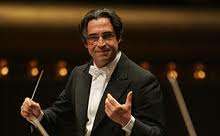|
Back
Italian Exuberance Held in Czech New York
Isaac Stern Auditorium, Carnegie Hall
10/05/2012 -
Antonín Dvorák: Symphony Nr. 5 in F Major, Opus 76
Giuseppe Martucci: Notturno, Opus 70 Nr. 1
Ottorino Respighi: Feste romane
Chicago Symphony Orchestra, Riccardo Muti (Music Director/Conductor)

R. Muti (© Courtesy of the Artist)
Would it be too brazen to say that the Chicago Symphony Orchestra last night was striking?
Oh...er...I forgot. No the CSO was not striking. They had come off their union strike just in time for three concerts here in New York.
Yet those sounds were indeed striking. The orchestra which once belonged to Sir Georg Solti has retained that same big Mitteleuropa sound. Riccardo Muti is totally Italian–Neapolitan, in fact–in his lyricism and grandeur and spectacular operatic ambience, as he showed in the second half. But in a rarely played Dvorák work, he produced a unique ensemble sound. Herbert von Karajan was a one-time mentor, but the CSO was no flashy orchestra. It was, and is, an orchestra which gives the sound of a full orchestra in full gear. It is no stodgy 19th Century ensemble, but in the Dvorák it preserved a 19th Century aura of amiability, geniality, a richness of spirit.
The Fifth was a good vehicle for Mr. Muti, since from the start, the piece is more a painting than drama. Those first eight woodwind measures are like Dvorák’s example of the Ring opening. So lyrical, so tempered, so...well, in Muti’s feeling, an al fresco opening. In fact, as he went on in the symphony, I wished that he continued with the elegiac start, for the rest is not Dvorák’s most memorable.
It is a pretty work, and Mr. Muti played with pretty touches. The mournful dumka dance movement gave subtle indication of dance, the third movement was a pleasant scherzo,, and in the finale did the CSO give a simulacrum of drama.
But that was Riccardo Muti’s way. He wanted a rich sound, woodwinds which captured the Czech forests, with happy flow , and his orchestra gave it to him.
The second half, though, was showmanship of the highest order. Mr. Muti gave acharacteristically little speech before. None of that prepared one for the Nocturne by Giuseppe Martucci, a composer mainly forgotten today but apparently a superb late 19th Century pianist. One would have expected a prosaic nocturne, but this piano piece, which he orchestrated later, was most surprising. In fact, the first minute or two could have been a Mahler slow movement.
Far-fetched, perhaps, though the glowing strings and horns were so tender and lulling. Then again, Mahler would have gone off this atmospheric walk in the woods with some eccentric changes in rhythm, key, harmony, orchestration. Martucci was content to go his own pleasant (and predictable) way.
The last work was of course the triumph of Italy in all its wildness. The NY Phil played Respighi this week, and while I couldn’t attend, I have no doubt that Alan Gilbert gave it everything necessary for its success. Riccardo Muti is its success.
Far from being a blatant brassy showpiece, Roman Festivals was a Respighi masterpiece of the grandeur that was Rome with four tapestries of hymns, cacophonies, fanfares, sanctimony and circuses.
And how conductor Muti reveled in these sounds. Beginning with a chorus of buccinae–ancient Roman brass–played by trumpets in the balcony, he included mandolin and organ, sleigh bells, a simulated hurdy-gurdy (Respighi was as detailed a tone-painter as Strauss), howling lions, martyred Christians, and the revelation of Eternal Rome from the outlying mountains. held under tight control of the conductor.
I was surprised to see that the premiere of this (and the Martucci) took place in New York, by Toscanini in 1921, but such music, except to the pristine, is internationally glorious.
As is, of course, Riccardo Muti himself.
Harry Rolnick
|